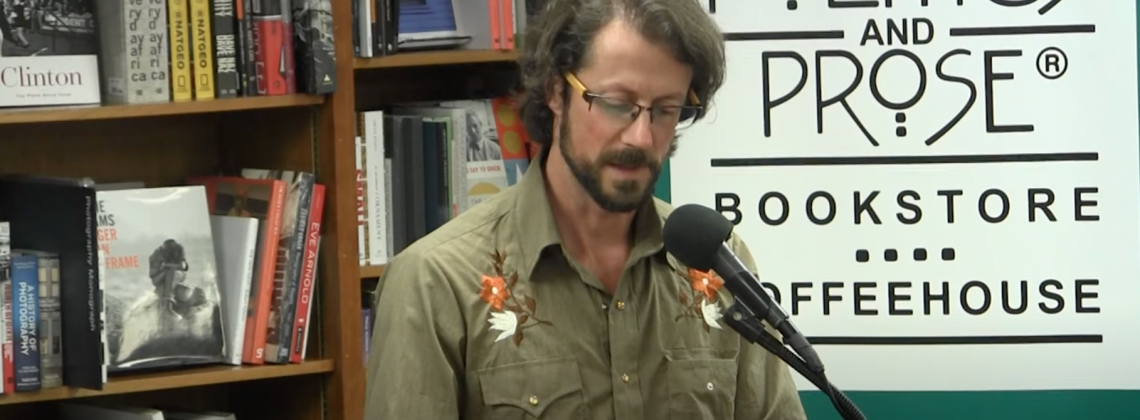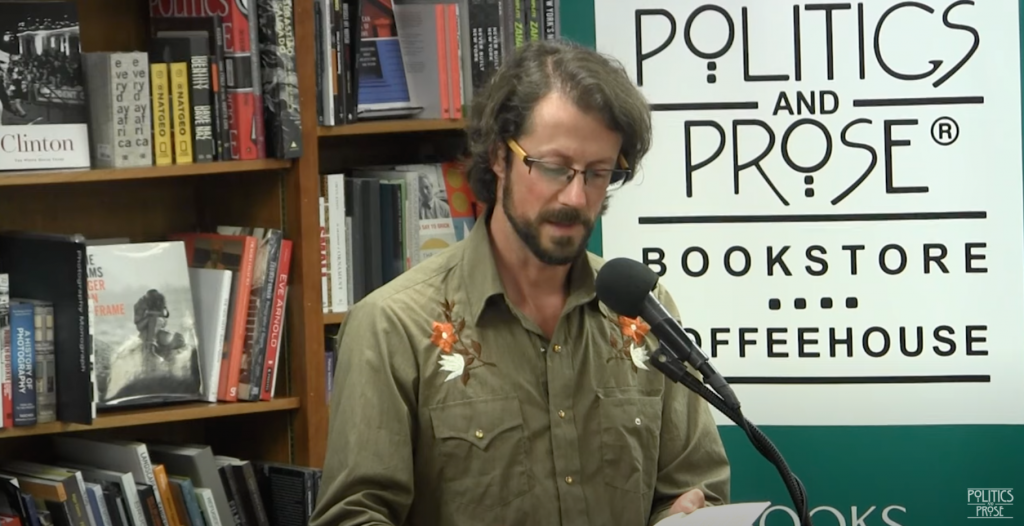

Paul Kingsnorth may have left the environmental movement. But his trek continues on.
The future is one thing official America hasn’t had to worry about in a long time. It’s not for nothing that optimism crowns our virtues and pessimism our deadly sins. We call our way Progress but, like all faiths, it’s something we feel more than we say. Progress abides. It guides. It keeps us gliding into a future we can believe in, pandemics, recessions, insurrections be damned. Progress offers rest, such reliable rest, for our souls.
Paul Kingsnorth wasn’t formed in the American version of this faith—he, an English writer born in 1972, had that going for him, at least. Still, the American faith in Progress is simply the purest version of the general, ascendent belief in the global capitalist order, and—like all faiths (or at least the living ones)—it is an ascendance swollen with an undercurrent of desperation.
Faith in progress never took with Kingsnorth. He began agitating as an environmental activist in his early 20s; by 2001 The New Statesman deemed him one of “Britain’s top ten troublemakers.” But earning such honorifics was not the point for Kingsnorth. He was guided by the conviction that “Nothing humans could build could come close to the intense wonder and mystery of the natural world.” He thought that not only are “some things . . . precious for their own sake,” they are “food for the human soul.” Saving the natural world from the civilization Progress had built was what he “vowed, self-importantly” to make his “life’s work,” as he later put it.
He didn’t get very far. Imploding a faith is beyond the reach of almost any movement, especially a faith practiced in fervent, hour-by-hour rituals of obeisance and sacrifice. Kingsnorth had arrived at this conclusion by the late 2000s; in 2012 he published “Confessions of a Recovering Environmentalist,” in which he announced, “I am leaving. I am going to go out walking.”
What, exactly, was he leaving? A movement that had transformed itself into, as he memorably put it, “the catalytic converter on the silver SUV of the global economy.” According to the new environmentalist vision, capitalism was going to solve its own monumental problems, thanks to a great green wave, a tide of activism that by the new century’s second decade had transformed the ideal of “sustainability” into a goal of political leaders everywhere. Sustainability had become the supra-ideology that had conquered all.
Not Kingsnorth, though. To him, this next-gen environmentalism was simply “business-as-usual: the expansive, colonizing, progressive human narrative, shorn only of carbon.” Mainstream environmentalists had become merely mainstream. Rather than offering a new direction, a more hopeful form of life itself, they were ushering in “the latest phase of our careless, self-absorbed, ambition-addled destruction of the wild, the unpolluted, and the non-human.” He was done.
But he was not stopping. He was going “on a pilgrimage.”
Faith is not a choice of the soul. Rather, it is the soul’s condition. When over Christmas this past year I read Kingsnorth’s 2019 book Savage Gods I could feel a crisis of faith that had, as his pilgrimage continued, gathered to a breaking point. If he was a recovering environmentalist, he was still far from whole. “You have to come apart to be put back together in a different shape,” he reflected. In Savage Gods he lays out his coming apart. It is a plea for salvation fueled by fear of destruction.
The destruction in question was the destruction of mind itself, not simply his own but the possibility of mind, period—as Westerners, at least, have imagined it. The “savage gods” of the book’s title were the mind’s chief means of expression: words—words that had begun to seem “transparent and suddenly fragile.” His questions were ancient and deep. “Did growing up with language mean I would always feel disconnected?” “Do I have to walk out there unarmed with ideas and representations of ideas before I can be part of the world again? How the hell could I possibly do that?”
It was to this crisis that his quest had unexpectedly led, a treacherous path. On the book’s first page he confesses, “I am a lost person. I wouldn’t write books if I wasn’t lost. I wouldn’t write anything at all if I wasn’t in search of paradise, and I wouldn’t be in search of paradise if I didn’t need it.”
Sensing this need ten years earlier, he and Dougald Hine had, perhaps counterintuitively, launched the Dark Mountain Project, a gathering place and workspace for writers and artists who begin their work from the premise that it is (as their manifesto has it) “our civilisation’s turn to experience the inrush of the savage and the unseen; our turn to be brought up short by contact with untamed reality. There is a fall coming.” In the company of this new community Kingsnorth began to publish critically acclaimed fiction and poetry, seeking the stories that might repair rupture and reignite faith—and life itself. He and his family moved from England to the west of Ireland and began farming, homeschooling, planting trees. If, as he said in a 2017 interview, “the severing of people away from everything else that lives is the heart of the crisis that we’re in,” he and his wife were seeking, at least for their family, to close that distance in the day-to-day, come what may.
But the distance between himself and words began to open up. “The words are not alive,” he confessed. “My words do not dance because there is no magic in them, and unless there is magic in them nobody should speak words.” This was not metaphor. A Zen Buddhist, Kingsnorth had more recently experienced what he calls “real” magic in a Wiccan coven. But his crisis mounted all the same. “Writers fall short of everything except creating sentences,” he, with cruel honesty, noted. And sentences, made of words, finally failed him. “I feel that words are savage gods and that in the end, however well you serve them, they will eat you alive.”
My wife, who had read Savage Gods earlier in the year, asked me what I thought of it. It was piercing, perplexing, unnerving, I said. What happens when a writer loses the capacity to explain language to himself?
So when the news reached me that Kingsnorth had been baptized this past January into the Romanian Orthodox Church, I had a classic shocked-but-not-surprised moment. Something had to give. It turns out that within a matter of months Kingsnorth had been jolted toward a place he had barely visited, let alone lived. It’s a story worth reading (and listening to, for those interested in hearing his voice or watching him speak). Through a series of unanticipated encounters and exchanges Kingsnorth found himself “on a mystical path, an ancient and rooted thing, pointing to a world in which the divine is not absent but everywhere present, moving in the mountains and waters.” He calls his conversion a “reversion to the sacred order of things.”
It’s hard for us to take such conversions seriously. Does anyone give anything but an ironic listen to Dylan’s Slow Train Coming?
Paul Kingsnorth deserves better.
In his 2012 essay, when he announced he was “going to go out walking,” he had said—with no hint of irony—“I am going to listen to the wind and see what it tells me, or whether it tells me anything at all.” And, he added, someday “I might even come back. And if I am very lucky I might bring with me a harvest of fresh tales, which I can scatter like apple seeds across this tired and angry land.”
His tales are being whispered about in this angry land of Progress. If we can own up to our own troubled faith, maybe we’ll grow more attentive to the living faith of others. Then some real progress might happen.
Eric Miller is Professor of History and the Humanities at Geneva College, where he directs the honors program. His books include Hope in a Scattering Time: A Life of Christopher Lasch, and Brazilian Evangelicalism in the Twenty-First Century: An Inside and Outside Look (co-edited with Ronald J. Morgan). He is the Editor of Current.